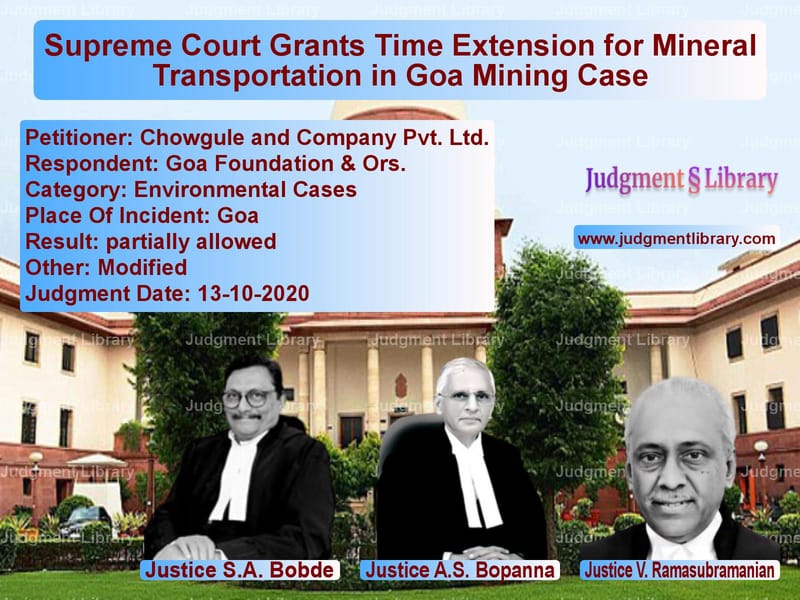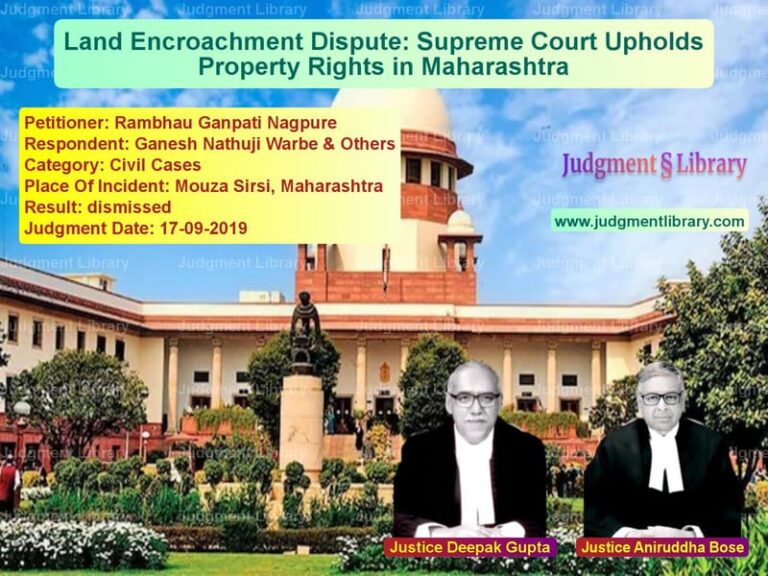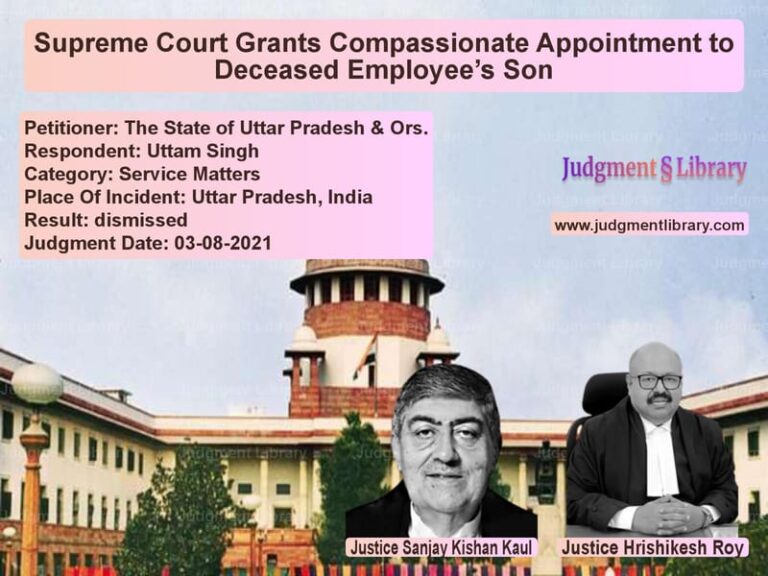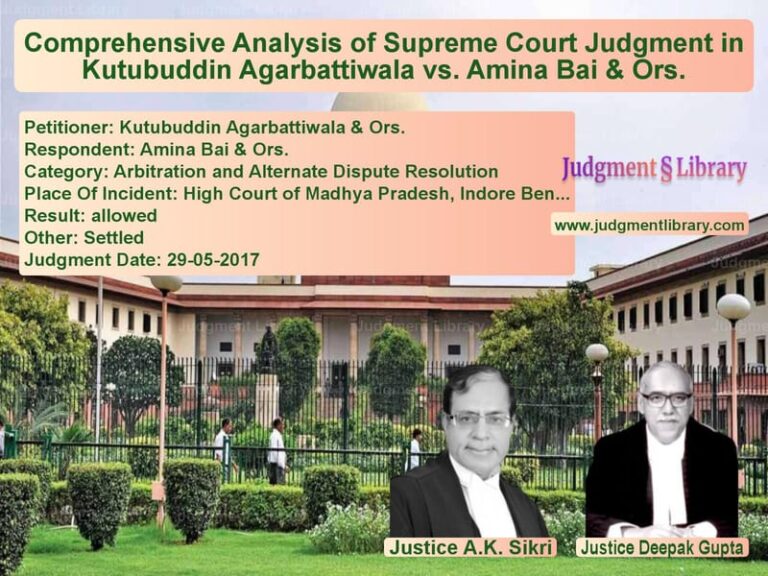Supreme Court Grants Time Extension for Mineral Transportation in Goa Mining Case
The case of Chowgule and Company Pvt. Ltd. vs. Goa Foundation & Ors. is a significant ruling by the Supreme Court of India that addresses the issue of time extension for transporting minerals excavated before the mining ban in Goa. The Court dealt with multiple applications seeking an extension to transport minerals mined before 15 March 2018, following the earlier judgment in Goa Foundation-II and Goa Foundation-III.
The judgment is crucial as it balances environmental concerns with the economic interests of mining lessees while clarifying legal principles related to mining operations and transportation of already mined minerals.
Background of the Case
The case arose due to the ban imposed on mining operations in Goa. The Supreme Court, in Goa Foundation vs. Union of India-I, held that all iron ore and manganese ore leases had expired on 22 November 2007, and any mining carried out beyond that date was illegal.
Subsequently, in Goa Foundation-II, the Court directed that all mining operations should cease by 15 March 2018. However, ambiguity existed regarding whether the time given for managing affairs included the removal of mined minerals. This issue was resolved in Goa Foundation-III, where the Court ruled that only mining operations were prohibited, not the transportation of legally mined minerals.
Legal Dispute and Applications Filed
Several mining leaseholders filed applications before the Supreme Court, seeking an extension to transport minerals allegedly excavated before 15 March 2018. These applications were opposed by Goa Foundation, which sought directions for confiscation of minerals and recovery of amounts from unauthorized transportation.
Petitioners’ (Mining Lessees) Arguments
The petitioners, represented by senior counsel, argued:
- The delay in transportation was due to administrative reasons, including delays in obtaining transit permits.
- The COVID-19 lockdown imposed on 24 March 2020 restricted movement and further delayed transportation.
- They had legally mined the minerals before the cut-off date, and transportation was not prohibited under previous Court rulings.
- They had already paid royalties and other charges for the minerals.
Respondents’ (Goa Foundation) Arguments
Goa Foundation, represented by senior advocate Prashant Bhushan, countered:
- The extension should be denied as mining operations had ceased, and further transportation would be illegal.
- Rule 12(1)(hh) of the Minerals (Other than Atomic and Hydrocarbons Energy Minerals) Concession Rules, 2016, allows the government to confiscate minerals not removed within six months of lease expiry.
- Records showed that only 73,850.26 tonnes of ore had royalty paid, while the remaining minerals were unverified.
- Extending time for transportation would lead to potential misuse and illegal mining activities.
Supreme Court’s Observations and Judgment
The Supreme Court, led by S.A. Bobde, A.S. Bopanna, and V. Ramasubramanian, made the following key observations:
- Right to Remove Mined Minerals: The Court reaffirmed that transportation of minerals mined before 15 March 2018 was not prohibited.
- Royalty Payment Required: The lessees must prove that royalties were paid before they could transport the minerals.
- Government’s Right to Confiscate: The State could invoke Rule 12(1)(hh) to confiscate minerals if they were not transported within the extended period.
- COVID-19 Consideration: The Court acknowledged the delay caused by the pandemic and granted an extension.
Final Judgment
The Supreme Court ruled:
- Time extended until January 2021 for the transportation of minerals excavated before 15 March 2018.
- Lessees must prove royalty payments before transporting minerals.
- If minerals are not removed within the extended period, the government must invoke Rule 12(1)(hh) for confiscation.
- The quantity of minerals to be removed must be verified against government records.
Conclusion
The Supreme Court’s decision in this case strikes a balance between environmental concerns and economic interests. While upholding the mining ban, the judgment allows legitimate transportation of already mined minerals under strict conditions. The ruling ensures transparency, prevents illegal mining activities, and reinforces the legal framework governing mineral transportation.
Petitioner Name: Chowgule and Company Pvt. Ltd..Respondent Name: Goa Foundation & Ors..Judgment By: Justice S.A. Bobde, Justice A.S. Bopanna, Justice V. Ramasubramanian.Place Of Incident: Goa.Judgment Date: 13-10-2020.
Don’t miss out on the full details! Download the complete judgment in PDF format below and gain valuable insights instantly!
Download Judgment: Chowgule and Company vs Goa Foundation & Ors Supreme Court of India Judgment Dated 13-10-2020.pdf
Direct Downlaod Judgment: Direct downlaod this Judgment
See all petitions in Public Interest Litigation
See all petitions in Legislative Powers
See all petitions in Judgment by S. A. Bobde
See all petitions in Judgment by A. S. Bopanna
See all petitions in Judgment by V. Ramasubramanian
See all petitions in partially allowed
See all petitions in Modified
See all petitions in supreme court of India judgments October 2020
See all petitions in 2020 judgments
See all posts in Environmental Cases Category
See all allowed petitions in Environmental Cases Category
See all Dismissed petitions in Environmental Cases Category
See all partially allowed petitions in Environmental Cases Category







